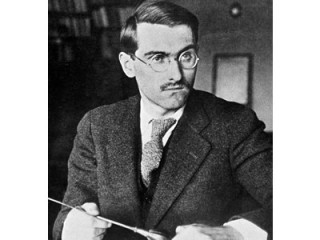
Jean Anouilh biography
Date of birth : 1910-06-23
Date of death : 1987-10-03
Birthplace : Serisole, France
Nationality : French
Category : Famous Figures
Last modified : 2011-07-15
Credited as : Drama writer, Medea, Prix mondial Cino Del Duca
Jean Anouilh was born in Cerisole, near Bordeaux, on June 23, 1910. His father, a tailor, and his mother, a violinist in an orchestra, undoubtedly imparted to their son respect for craftsmanship and a love of art. Anouilh received his primary and secondary education in Paris, where he later studied law for a year and a half. In 1929 he went to work in an advertising agency, for which he wrote publicity and comic film scripts for 2 years. After a period in military service, he was briefly (1931-1932) secretary to the great actor and director Louis Jouvet and married Monelle Valentin, an actress who later created the roles of many of Anouilh's heroines.
From early childhood Anouilh had been fascinated by the stage. He haunted theaters and was writing plays at the age of 12. Like many a stagestruck youth, he tended to confuse real life with the theater, a view which led him to sacrifice in his early plays substance for theatricality. Undaunted by Jouvet's lack of encouragement and by the near or total failure of his first plays, Anouilh stubbornly resolved to devote his life to the theater. Success came in 1937 with Le Voyageur sans bagages (Traveler without Luggage). Anouilh's popularity steadily increased in the next two decades both in France and abroad.
Profoundly impressed by the plays of Jean Giraudoux and Luigi Pirandello, which broke with the tradition of the realistic theater, Anouilh recognized the value of poetry, of illusion and fantasy, and of irony as a means of portraying basic truths about human life. He held the growing conviction that the essence of the theater, that is, its quality of make-believe, mirrors the pretense and self-delusion of life; this led him to exploit the artificiality of the theater as a way of exposing the falsity of men's motives and even of their allegedly noblest principles and sentiments.
Anouilh's constant preoccupation with the technical production of his plays gradually led him to the role of director. In this capacity he produced, in line with his own views, plays by others, including Moli'e, as well as his own.
Completely absorbed in his work, Anouilh avoided other involvements and chose a secluded private life. His first marriage ended in divorce, and he married another actress, Charlotte Chardon, in 1953. One of his children, Catherine, also an actress, starred in her father's plays.
Although Anouilh grouped his plays in several categories according to their predominant tone—pi'es (plays) roses (pink), noires (black), brillantes (brilliant), grinçantes (jarring), costumees (costumed), and baroques (baroque)— they all offer a unified and ever-deepening view of the human condition. His characteristic heroes are essentially rebels, revolting in the name of an inner ideal of purity against compromise with the immoral demands of family, social position, or their past. The fanciful or uncompromising efforts of the early heroes to escape from reality give way in most of the later plays to a profound bitterness caused by the recognition that no escape is possible. Among Anouilh's most admired plays are Le Bal des voleurs (1932; Thieves' Carnival), Antigone (1942), L'Invitation au chateau (1947; adapted as Ring Round the Moon), La Valse des toreadors (1951; The Waltz of the Toreadors), L'Alouette (1952; adapted as The Lark), Becket (1959), and Ne reveillez pas madame Don't Wake the Lady).
Anouilh died on October 3, 1987, in Lausanne, Switzerland.
Author of books:
L'Hermine (The Ermine) (1932)
Mandarine (1933)
Y avait un prisonnier (There Was a Prisoner) (1935)
Le voyageur sans bagage (Traveler without Luggage) (1937)
La sauvage (Restless Heart) (1938)
Le Bal des Voleurs (Thieves' Carnival) (1938)
Léocadia (Time Remembered) (1940)
Eurydice (Point of Departure and Legend of Lovers) (1941)
Le rendez-vous de Senlis (The Rendezvous at Senlis and Dinner with the Family) (1941)
Antigone (1942)
Roméo et Jeannette (Romeo and Jeannette) (1946)
Médée (Medea) (1946)
L'Invitation au Château (Ring Round the Moon) (1947)
Ardèle ou la Marguerite (Ardèle; The Cry of the Peacock) (1948)
La répétition ou l'amour puni (The Rehearsal) (1950)
Colombe (Mademoiselle Colombe) (1951)
La valse des toréadors (The Waltz of the Toreadors) (1952)
L'Alouette (The Lark) (1952)
Le Chevalier de la nuit (1953)
Cecile, ou L'ecole des pères (Cecile or School for Fathers) (1954)
Ornifle ou le courant d'air (Ornifle or It's Later than you Think) (1955)
Pauvre Bitos ou le dîner de têtes (Poor Bitos, or The Masked Dinner) (1956)
L'hurluberlu ou le réactionnaire amoureux (The Fighting Cock) (1959)
La petite Molière (1959)
Becket ou l'honneur de Dieu (Becket or The Honor of God) (1959)
La Grotte (The Cavern) (1961)
fables(1962)
Le boulanger, la boulangère et le petit mitron (1968)
Cher Antoine; ou l'amour raté (Dear Antoine; or The Love that Failed) (1969)
Les poissons rouges; ou Mon père, ce héros (The Goldfish) (1970)
Tu étais si gentil quand tu étais petit (You Were So Nice When You Were Young) (1972)
Monsieur Barnett (1974)
L'Arrestation (1975)
Chers zoizeaux (1976)
Vive Henri IV (1978)
La Culotte (1978)
La Foire d'empoigne (Catch as Catch Can) (1979)
Le Nombril (The Navel) (1981)
















